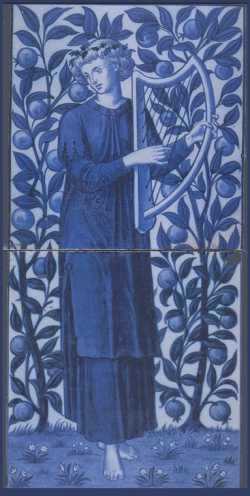Scop
After gory battles, weary warriors would gather in mead-halls to heal their wounds, drink mead and listen to the scop as he immortalized their victories in his rhythmic chant, accompanied by the sounds of the harp. Scops, or wandering poets, singing or chanting melodic poems to their harps, were the main form of entertainment and preservers of history in medieval Anglo-Saxon society (Cunningham, online). They were called scops ‘shaper(s)’ because they shaped "men's reputations by creating songs" about their achievements and accomplishments (Cunningham, online). In modern world, scops are better known as professional bards, storytellers or singers.
Because of their ability to tell stories in their songs, scops were greatly respected and valued among the tribal warriors. These warriors did not believe in a "Christian type of heaven," and for them, immortality meant being remembered on earth after their death (in battle or otherwise). Wealthy kings rewarded scops and in return, scops composed verses glorifying those kings and their deeds. In those days it was very honorable to have a song praising a hero's deed whether winning a battle, or dying in it.
 |
Before written language, oral representation of events and traditions was the only way for the people to learn about their past, major heroic deeds, and great warriors. Of course the stories inevitably changed as different scops sang them; some details were added, some omitted, but the essence of the stories was preserved. Through their chanting scops also "preserved the tradition of poetic eulogy,"(Britannica, online) and the overall history of the medieval period, and later on, it was put down on paper in monasteries by educated monks. For example the story of Beowulf is a long epic composed by a scop, telling about a hero and his heroic conduct. "The Wanderer" is another poem, much shorter, about an "earth-walker," the last or sole survivor of his tribe.
Thus, scops not only provided entertainment for the people, but also helped to preserve much of the ancient history through their "very structured and alliterate" (Britannica, on-line) poems and songs. They immortalized great warriors, kings and their victories and their significance in the ancient days. And they also gave us a lot of facts though their lyrics about old times.
|
Many years later, we learn about medieval traditions, old ways of life, and forgotten customs, through reading Anglo-Saxon literature. Those past events come to life ones again. Brave warriors fight evil monsters and dragons, and kings win battles, defeat rival tribes, and conquer new land. And, as we read those stories, we can imagine how it was to sit on a wooden bench in a cold mead-hall, hear the cracking of the fire, and the scop singing about daring battles, great heroes and former days.
